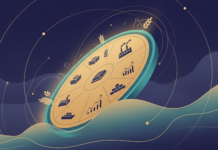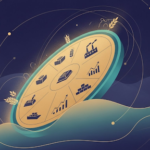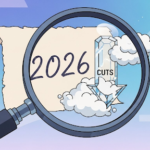A failed ocean in what is now the Amazon rainforest could soon help solve Brazil’s biggest agriculture problem
But to grow that food, Brazil depends on other nations for its most essential fertilizer — a mineral called potash.
In fact, Brazil imports about 98% of this critical nutrient from tens of thousands of miles away.
When the USA sanctioned Belarus in 2021 followed by Russia invading Ukraine in 2022, however, it exposed how fragile this supply chain really is.
Since Russia and Belarus control over 40% of the world’s potash supply, prices for fertilizer quadrupled almost overnight when the conflict began.
One solution may lie in an ancient ocean in Brazil’s state of Amazonas.
As the waters of the failed ocean receded, they left behind vast deposits of salt.
As a result, one of the world’s largest deposits may sit right in Brazil’s backyard.
Brazil Potash, a Canadian-incorporated mining company, is working to develop this massive basin — one which could change how the world’s largest food producer gets its most essential fertilizer.
A Basin Hiding in Plain Sight
The large deposit was first discovered back in the 1980s by Brazil’s state oil company, Petrobras.
While they were drilling for oil at that time, what they found instead was a basin potentially stretching 250 miles long by 93 miles wide containing vast deposits of potash.
A potash basin in Saskatchewan, Canada currently supplying a substantial portion of global potash today is currently being processed by several of the world’s largest resource companies like Nutrien, the Mosaic Company, and very soon BHP.
The basin in the state of Amazonas, on the other hand, is an untapped resource that’s been almost completely overlooked to date.
The location of the deposit also offers a rare combination of advantages.
The project sits just 5 miles from the Madeira River, a major transportation artery.
That would help Brazil Potash solve one of the biggest challenges in delivering fertilizer — getting the product to farmers both quickly and cost-effectively.
It’s also approximately 100 miles southeast of the city of Manaus, a manufacturing hub of 1.7 million people. That means access to a skilled workforce and modern facilities.
The processing of the fertilizer is remarkably simple. It uses only hot water to separate the potash — no chemicals are required.
Large sections of the processing plant can be built in Manaus’s climate-controlled warehouses and then moved by river barge to the site.
This prime location also means Brazil Potash can connect directly to the same transportation networks already used by major Brazilian farming companies.
Instead of waiting over 100-plus days for shipments from overseas suppliers, Brazil Potash’s management believes that farmers could receive their fertilizer in just 3 days.
When Markets Shifted Overnight
When the USA sanctioned Belarus in 2021, followed by Russia’s invasion of Ukraine in 2022, potash prices jumped from $300 to nearly $1,200 per ton almost overnight.
The impact reached far beyond fertilizer markets though. Rising fertilizer costs meant higher food prices worldwide, from wheat in Europe to soybeans in Asia.
For Brazil, the stakes were particularly high. Their farmers consume over 20% of the world’s potash, and their demand is growing much faster than the global average.
These farmers depend on suppliers from tens of thousands of miles away — mainly Russia, Belarus, and Canada — for approximately 98% of their potash.
Brazil’s government saw the warning signs. In 2022, they launched their National Fertilizer Plan with a clear goal: cut import dependence nearly in half by 2050.
Brazil Potash could play a key role in the shift. With production happening in Brazil, their projected cost to produce and deliver potash will be lower than the transportation cost alone for imported potash from competitors overseas.

Source: Brazil Potash Prospectus
This cost advantage doesn’t come from special technology or higher-grade deposits though.
It comes from simple geography – controlling this massive potash deposit located directly where the farmers need it most.
Beyond the First Discovery
While the basin’s location creates some obvious advantages, the sheer size of the basin could be even more important.
Brazil Potash expects production of the project to reach around 2.4 million tons of muriate of potash annually — enough to supply nearly 20% of Brazil’s current needs.
Estimates project that they could continue at that rate for up to 23 years or even potentially longer.
But that’s just the beginning of what this basin could deliver. If all goes to plan, the company could potentially expand to two more deposits directly adjacent to them.
Major players are already taking notice.
Franco-Nevada Corporation, one of the world’s most successful mining investment companies, has signed on as a cornerstone investor.
The Amaggi Group, one of the world’s largest private soybean producers with nearly $10 billion in annual revenue, has committed to a major offtake agreement.
The economics make it clear why these sophisticated players are getting involved.
The infrastructure is already in place to expand production significantly.
And with Brazil’s potash consumption projected to grow much faster than the global rate each year, the potential could be crucial for Brazil’s growing needs.
World-Class Mining with Local Leadership
With so much potential at play, Brazil Potash has brought on a world-class team to bring their plan to fruition.
Mayo Schmidt, who helped build Nutrien into the world’s largest potash producer with approximately $23 billion market cap, has agreed to chair Brazil Potash’s advisory board.
He’s joined by the former Attorney General of Brazil, the former Minister of Agriculture, and the former Senator of the largest farming region in Brazil among others.
The project has received a rare “Project of National Importance” designation from the government, while also gaining over 90% support from local indigenous communities.
Now, after years of preparation, Brazil Potash is ready to bring this asset into production.
The Path Forward
As global supply chains continue to shift, Brazil Potash stands at a pivotal moment.
- The Amazonas project has received all major permits to begin construction.
- They’ve already secured major offtake and transportation agreements with some of the biggest names in the industry.
- Plus, with multiple development catalysts on the near horizon, the project is projected to move toward production quickly.
The company’s agreements with major players like Franco-Nevada and Amaggi have already signaled what industry leaders are seeing in this property.
The timing couldn’t be more critical. The world needs 45% more food production by 2050 to feed a growing population.
Brazil, with its year-round growing season and abundant water, is uniquely positioned to help meet this challenge.
That’s why Brazil’s government has made domestic potash production a national priority, and why this ancient ocean basin could be key to feeding a growing world.
By. Stacy Graham
** IMPORTANT NOTICE AND DISCLAIMER — PLEASE READ CAREFULLY! **
PAID ADVERTISEMENT. This article is a paid advertisement. FTB Capital and its owners, managers, employees, and assigns (collectively “the Publisher”) is often paid by one or more of the profiled companies to disseminate these types of communications. In this case, the Publisher has been compensated by Brazil Potash Corp. (NYSE:GRO) to conduct investor awareness advertising and marketing. Brazil Potash paid two hundred thousand dollars for the creation and dissemination of this article and related articles and banner ads, eighty thousand dollars of which was paid to the Publisher. This compensation should be viewed as a major conflict with our ability to be unbiased.
Readers should beware that third parties, profiled companies, and/or their affiliates may liquidate shares of the profiled companies at any time, including at or near the time you receive this communication, which has the potential to hurt share prices. Frequently companies profiled in our articles experience a large increase in volume and share price during the course of investor awareness marketing, which often ends as soon as the investor awareness marketing ceases. The investor awareness marketing may be as brief as one day, after which a large decrease in volume and share price may likely occur.
This communication is not, and should not be construed to be, an offer to sell or a solicitation of an offer to buy any security. Neither this communication nor the Publisher purport to provide a complete analysis of any company or its financial position. The Publisher is not, and does not purport to be, a broker-dealer or registered investment adviser. This communication is not, and should not be construed to be, personalized investment advice directed to or appropriate for any particular investor. Any investment should be made only after consulting a professional investment advisor and only after reviewing the financial statements and other pertinent corporate information about the company. Further, readers are advised to read and carefully consider the Risk Factors identified and discussed in the advertised company’s SEC and/or other government filings. Investing in securities is speculative and carries a high degree of risk. Past performance does not guarantee future results. This communication is based on information generally available to the public, and does not (to the Publisher’s knowledge, as confirmed by Brail Potash) contain any material, non-public information. The information on which it is based is believed to be reliable. Nevertheless, the Publisher cannot guarantee the accuracy or completeness of the information.
SHARE OWNERSHIP. The Publisher does not own shares and/or options of the featured company. However, a third party marketing company that assisted in the production and distribution of these materials is a shareholder in the company, and therefore has an additional incentive to see the featured company’s stock perform well. The Publisher does not undertake for itself or others any obligation to notify the market when a decision is made to buy or sell shares of the issuer in the market. This is why we stress that you conduct extensive due diligence as well as seek the advice of your financial advisor or a registered broker-dealer before investing in any securities.
FORWARD LOOKING STATEMENTS. This publication contains forward-looking statements, including statements regarding expected continual growth of the featured company and/or industry. The Publisher notes that statements contained herein that look forward in time, which include everything other than historical information, involve risks and uncertainties that may affect the companies’ actual results of operations. Factors that could cause actual results to differ include, but are not limited to, government regulations concerning potash production, the size and growth of the market for potash, the companies’ ability to fund its capital requirements in the near term and long term, pricing pressures, etc.
INDEMNIFICATION/RELEASE OF LIABILITY. By reading this communication, you acknowledge that you have read and understand this disclaimer, and further that to the greatest extent permitted under law, you release the Publisher, its affiliates, assigns and successors from any and all liability, damages, and injury from this communication. You further warrant that you are solely responsible for any financial outcome that may come from your investment decisions.
TERMS OF USE. By reading this communication you agree that you have reviewed and fully agree to the Terms of Use found here http://GlobalInvestmentDaily.com/Terms-of-Use. If you do not agree to the Terms of Use http://GlobalInvestmentDaily.com/Terms-of-Use, please contact GlobalInvestmentDaily.com to discontinue receiving future communications.
INTELLECTUAL PROPERTY. GlobalInvestmentDaily.com is the Publisher’s trademark. All other trademarks used in this communication are the property of their respective trademark holders. The Publisher is not affiliated, connected, or associated with, and is not sponsored, approved, or originated by, the trademark holders unless otherwise stated. No claim is made by the Publisher to any rights in any third-party trademarks.

























